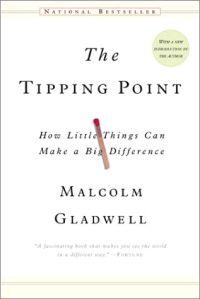

Purchase
How Little Things Can Make a Big Difference
Back Bay
January 2002
304 pages
ISBN: 0316346624
EAN: 9780316346627
Trade Size (reprint)
Add to Wish List
Non-Fiction
Why did crime in New York drop so suddenly in the mid-90s?
How does an unknown novelist end up a bestselling author?
Why is teenage smoking out of control, when everyone knows
smoking kills? What makes TV shows like Sesame Street so
good at teaching kids how to read? Why did Paul Revere
succeed with his famous warning? In this brilliant and
groundbreaking book, New Yorker writer Malcolm Gladwell
looks at why major changes in our society so often happen
suddenly and unexpectedly. Ideas, behavior, messages, and
products, he argues, often spread like outbreaks of
infectious disease. Just as a single sick person can start
an epidemic of the flu, so too can a few fare-beaters and
graffiti artists fuel a subway crime wave, or a satisfied
customer fill the empty tables of a new restaurant. These
are social epidemics, and the moment when they take off,
when they reach their critical mass, is the Tipping Point. In The Tipping Point, Gladwell introduces us to the
particular personality types who are natural pollinators of
new ideas and trends, the people who create the phenomenon
of word of mouth. He analyzes fashion trends, smoking,
children's television, direct mail and the early days of
the
American Revolution for clues about making ideas
infectious,
and visits a religious commune, a successful high-tech
company, and one of the world's greatest salesmen to show
how to start and sustain social epidemics. The Tipping
Point
is an intellectual adventure story written with an
infectious enthusiasm for the power and joy of new ideas.
Most of all, it is a road map to change, with a profoundly
hopeful message--that one imaginative person applying a
well-placed lever can move the world.
Comments
No comments posted.
Registered users may leave comments.
Log in or register now!
| 


 © 2003-2025 off-the-edge.net
all rights reserved Privacy Policy
© 2003-2025 off-the-edge.net
all rights reserved Privacy Policy